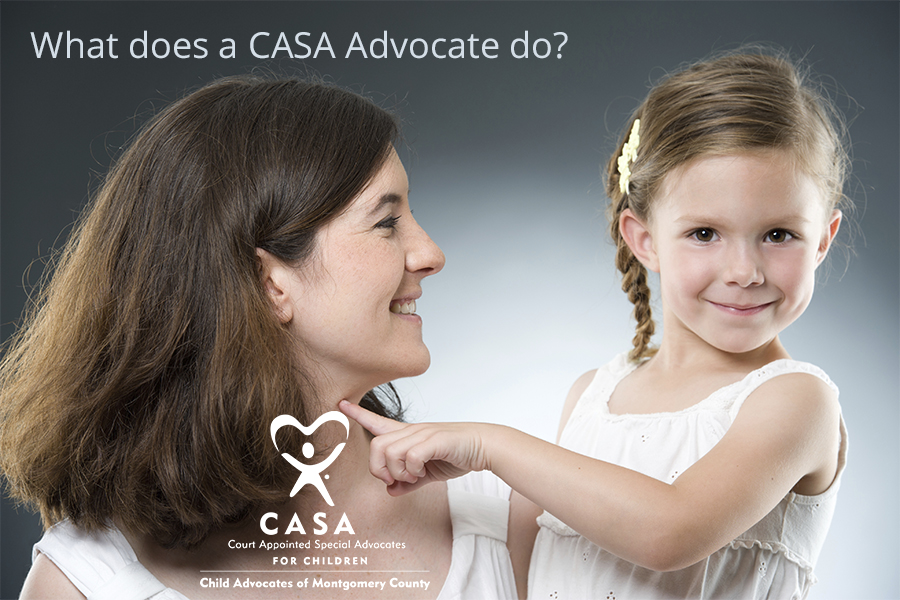What does a CASA Advocate do?

In 2013, there were 796 children in foster care in Montgomery County. While each child’s story is unique, there are some identifiers that are common to foster children. Many are shuffled from foster home to foster home, during which time lapses in education often occur due to these frequent moves. Abused and neglected children often feel unwanted and unloved and are also at a higher risk of being re-victimized.
These 796 Montgomery County children need someone to have their back. A person who will look into their specific case, who will get to know them and be their voice. Someone to advocate his or her best interest. As a Court Appointed Special Advocate (CASA), you can do just that.
After completing an application process and training, you will be able to help children who desperately need someone like you on their side. If you’re saying to yourself, “Yes, I’d like to help, but what, exactly, would I be doing?” read on:
CASA volunteers are appointed by judges to advocate for the best interests of abused and neglected children in court and other settings. The primary responsibilities of a CASA volunteer are to:
- Gather information: Review documents and records, interview the children, family members and professionals in the children’s lives.
- Document findings: Provide written reports at court hearings.
- Appear in court: Advocate for the child’s best interests and provide testimony when necessary.
- Explain what is going on: Help the child understand the court proceedings.
- “Be the glue”: Seek cooperative solutions among individuals and organizations involved in the children’s lives. As one volunteer said: “Be the glue that connects the pieces in a complicated child welfare system.”
- Recommend services: Ensure that the children and their family are receiving appropriate services and advocate for those that are not immediately available. Bring concerns about the child’s health, education, mental health, etc. to the appropriate professionals.
- Monitor case plans and court orders: Check to see that plans are being followed and mandated review hearings are being held.
- Keep the court informed: Update the court on developments with agencies and family members. Ensure that appropriate motions are filed on behalf of the child so the court knows about any changes in the child’s situation.
You don’t need to know about court proceedings or have legal experience to become a CASA. You will be able to rely on your training, CASA staff members, and fellow Advocates to help you become familiar with your roles and responsibilities. In the same vein, you don’t have to have a professional background as a caseworker or counselor to help a child. You will be trained to know specifically how you can help and when to recommend a professional.
You will need are organizational skills and the ability to complete reports and paperwork in a timely, legible, and professional manner. You will also need to be understanding, compassionate, a good communicator, a team player, and have a high level of maturity. If you are detailed oriented and have the ability to see how coordinated efforts work together for one goal, you may just be a foster child’s dream come true–that is, his or her ticket to a safe, permanent, loving home.
